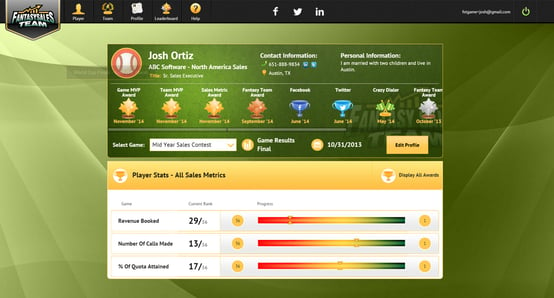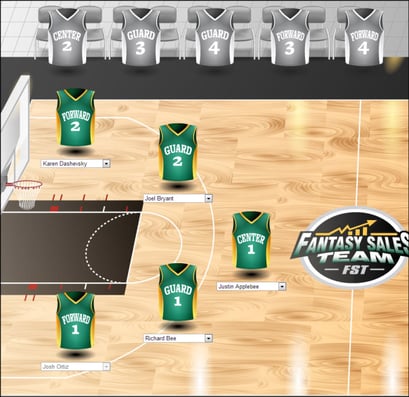The New Employee of the Month

By Allison Howen, Associate Editor
The "employee of the month" program has been around for decades.
Along with bragging rights, these top employees typically receive a variety of other "perks," such as a certificate, a front-row parking spot or a monetary bonus. In short, the title and perks are management's way of motivating its staff, which, hopefully, wants to perform well enough to earn the award.
While the employee of the month program and other traditional sales contests can be effective motivation tactics, they can also backfire. Traditional sales contests, for example, have a tendency to lose their appeal. Since perpetual top performers typically win these contests, it doesn't take long for underperformers (who need the most motivation) to disengage. Moreover, it can be difficult and/or time consuming to accurately measure results. This is why many enterprises are turning to gamification to motivate employees.
Gamification...Internally?
Gamification is a strategy that has been adopted by a variety of brands across the Web, typically in an effort to increase loyalty and engagement among consumers. This is done by providing consumers with some type of reward - from points to exclusive discounts - for completing specific tasks, sharing articles via social media or visiting websites multiple days in a row.
This concept is beginning to have appeal as an internal motivation tool too. The following three companies are among the top performers helping brands gamify their employee motivation efforts.
FantasySalesTeam
Used by enterprises like Cisco, LinkedIn and HP, FantasySalesTeam is a gamification platform that is modeled after fantasy sports, where success often depends on getting the most out of all of a team's members, not just star players - an important element of any incentive program.
"A lot of companies talk about gamification as a way to make work fun," said Adam Hollander, CEO of FantasySalesTeam. "While that's a byproduct of gamification - it's not the goal. The goal is to drive improved results across the metrics that matter to your business. The key to seeing ROI is engaging/motivating a larger portion of your team for a longer period of time while reducing operational cost/hassle."
Using FantasySalesTeam, companies can move closer to a ROI by setting goals to drive employee performance and behavior. Sorting employees into teams will also help level the playing field between top performers and new/low performers, to ensure everyone stays motivated. Furthermore, FantasySalesTeam enables users to monitor employee performance via Excel or integrations with existing customer relationship management (CRM) systems like Salesforce and Microsoft Dynamics. According to Hollander, this can help enterprises strengthen team adoption of CRMs.
"Our games can pull data from your existing systems like CRM or LMS," said Hollander. "If a player knows that they won't earn points in the game unless they log a call or create an opportunity - it forces adoption of the CRM. It also allows for near real-time updates of the leaderboards without any operational management of the game. This makes the results more visible and engaging to interact with in the form of profiles, performance charts, badges/trophies and leaderboards."

On the FantasySalesTeam profile dashboard, users can view information like stats and awards. Badgeville
Popular gamification company Badgeville offers solutions for both customer and employee engagement. With the employee engagement solutions, enterprises can create motivational programs to engage customer support teams, increase sales and productivity, as well as encourage employee collaboration.
The customer support solution, for example, helps enterprises measure, analyze and reward employee behaviors. In fact, Badgeville notes that, on average, its customer support solution reduces support tickets filed by 20 percent and improves ticket response time by 40 percent. On the other hand, the company's sales productivity solution can be leveraged to assist sales leaders in providing a more engaging user experience on top of their sales applications, which drives adoption and improves employee performance. According to Badgeville, this solution typically results in a 30 percent faster sales cycle and 50 percent faster CRM and sales app adoption.
Regardless of the solution chosen, Badgeville's gamification offerings have been used to help a variety of enterprises, from American Express to Marketo, better engage employees, heighten performance and measure their ROI.

Enterprises can sort their employees into teams with FantasySalesTeam. GamEffective
While GamEffective doesn't offer customer-facing solutions like Badgeville, it does offer a variety of employee gamification options, including those for employee training, sales and customer service teams.
In general, GamEffective's solutions provide enterprises with strong narratives that drive positive employee behavior. The company offers a variety of themes, from fantasy sports leagues to virtual city-building, which encourage both teams and individuals to perform better.
GamEffective doesn't stop there. It helps enterprises measure employee engagement with insights into employee behavior. The company's employee training solution, for instance, mixes game mechanics with training tasks to improve employee on-boarding, which can result in a higher ROI and a more knowledgeable staff. The platform provides users with a personal avatar to let them know how far they have progressed, how they compare to others and what else they should do to advance in the training process.
It is also important to note that GamEffective is offered as a software-as-a-service solution as well as a private cloud. Additionally, the gamification solutions are easy to implement and require no code, and can also integrate with many platforms and software, including Oracle, Zendesk, Yammer and Salesforce.
Introducing the Virtual Employee of the Month
Consider introducing your enterprise's new employee of the month - an internal gamification solution - at your next meeting. Although this employee won't benefit from perks like front-row parking, it will be able to motivate the rest of your team.

Subscribe to Our Newsletter!
Latest in Marketing








